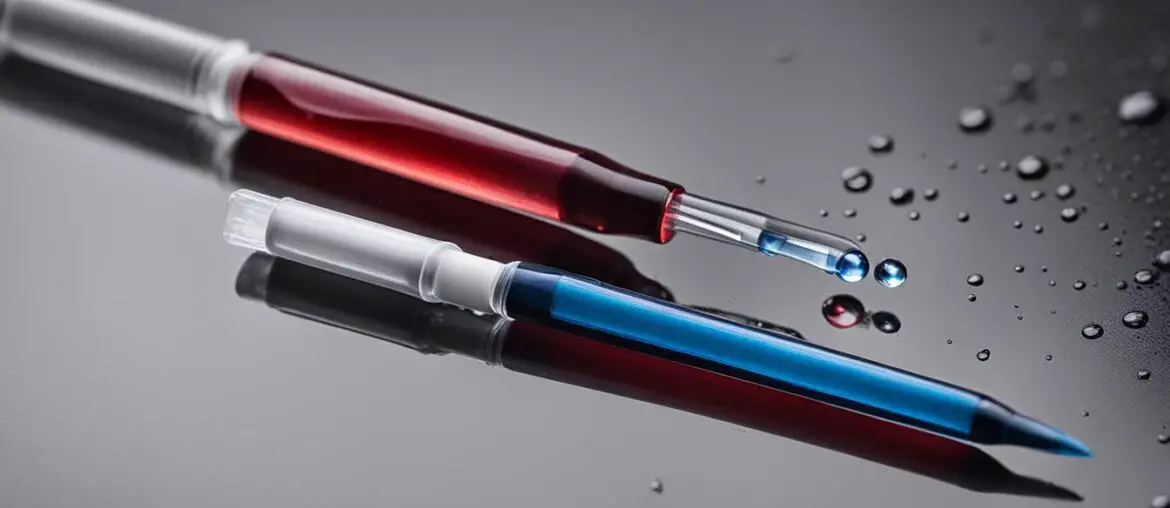Did you know that HCG drops can have a significant impact on the accuracy of pregnancy test results? It’s important to understand the timing and effects of HCG injections before taking a urine pregnancy test (UPT). The medication used in hCG injections, such as Generic hCG, Novarel, Ovidrel, and Pregnyl, is designed to induce the final maturation of the egg and promote ovulation.
- The medication used in HCG injections, such as HCG drops, can interfere with the accuracy of pregnancy tests.
- It takes approximately 24 to 36 hours for the eggs to be released after an HCG injection.
- Testing too soon after an HCG injection can result in a false positive due to the presence of the medication in the bloodstream and urine.
- Waiting for the prescribed time and undergoing a blood pregnancy test is recommended for accurate results.
- Consulting with a healthcare provider and following the prescribed timing and instructions can help ensure reliable results.
Understanding HCG and Pregnancy Tests
Human Chorionic Gonadotropin (HCG) is a hormone produced during pregnancy and is also the hormone detected in a pregnancy test. However, hCG can be administered in the form of injections, such as hCG drops, to mature eggs and induce ovulation. The hormone is similar to LH, which rises before ovulation and triggers the release of the egg. Therefore, hCG injections can cause a similar response in the ovaries and promote ovulation.
When undergoing fertility treatments, it is important to understand that hCG injections can interfere with the accuracy of pregnancy tests. Home pregnancy tests detect the presence of HCG in urine, and if taken too soon after an hCG injection, the test may detect the medication rather than the HCG produced during pregnancy.
Timing of Pregnancy Tests with HCG Drops
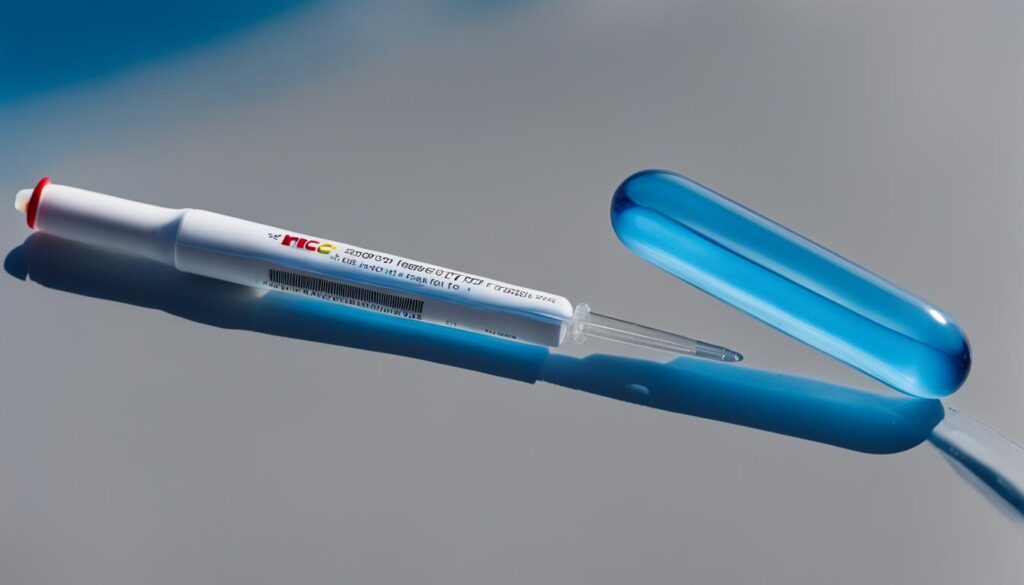
When it comes to using HCG drops for pregnancy testing, timing is everything. It’s crucial to understand that it takes approximately 10 days for the HCG medication to clear from the bloodstream and urine. Taking a pregnancy test within this timeframe can lead to inaccurate results, including false positives due to the presence of the medication. To ensure reliable results, it is recommended to wait for the prescribed time, typically 12-14 days after insemination or embryo transfer in fertility treatments, before undergoing a blood pregnancy test.
Testing at home before the prescribed time can be tempting, but it’s important to resist the urge. Premature testing can lead to false results, causing confusion and disappointment. Instead, exercise patience and give the HCG drops enough time to dissipate from your system before taking a pregnancy test. Waiting for the prescribed time frame will provide more accurate results and minimize the risk of false positives or false negatives.
Remember, the goal is to achieve reliable and trustworthy results. Waiting for the appropriate time will ensure that your pregnancy test is not influenced by the lingering effects of HCG drops.
“Timing is crucial when using HCG drops for pregnancy testing. Patience is key to obtaining accurate results and avoiding unnecessary confusion.”
Recommended Timing for Pregnancy Testing with HCG Drops:
| Procedure | Prescribed Timing |
|---|---|
| Insemination | 12-14 days after insemination |
| Embryo Transfer | 12-14 days after embryo transfer |
By adhering to the prescribed timing, you can ensure more reliable and accurate results. Waiting for the recommended timeframe before undergoing a blood pregnancy test will provide a clearer picture of your pregnancy status and help avoid any unnecessary confusion or disappointment.
Now that you understand the importance of timing in pregnancy testing with HCG drops, let’s delve further into the sensitivity of pregnancy tests and HCG drops in the next section.
Sensitivity of Pregnancy Tests and HCG Drops
When it comes to ensuring accuracy with HCG drops and pregnancy tests, understanding the sensitivity of the tests is vital. Not all pregnancy tests are created equal, and some are more sensitive than others in detecting low levels of HCG in the urine.
When using HCG drops, it’s essential to consider the sensitivity of the pregnancy test you are using. More sensitive tests require a smaller amount of HCG in the urine to provide a positive result. On the other hand, less sensitive tests may require higher HCG levels to produce a positive result.
If you take a pregnancy test too soon after an hCG injection, the test may detect the remaining medication rather than the HCG produced during pregnancy, leading to a false positive result. Therefore, it’s crucial to follow the instructions provided with the pregnancy test and wait for the recommended time before testing, ensuring accurate results when using HCG drops for pregnancy testing.
| Test Sensitivity | Time to Wait Before Testing |
|---|---|
| High sensitivity | 7-10 days after HCG injection |
| Medium sensitivity | 10-14 days after HCG injection |
| Low sensitivity | 14-21 days after HCG injection |
As shown in the table above, the time to wait before testing may vary depending on the sensitivity of the pregnancy test. It’s important to choose a test that aligns with the recommended timeframe and sensitivity to ensure accurate results.
By considering the sensitivity of pregnancy tests and following the appropriate waiting time, you can increase the accuracy of test results when using HCG drops for pregnancy testing.
Factors Affecting Home Pregnancy Test Accuracy
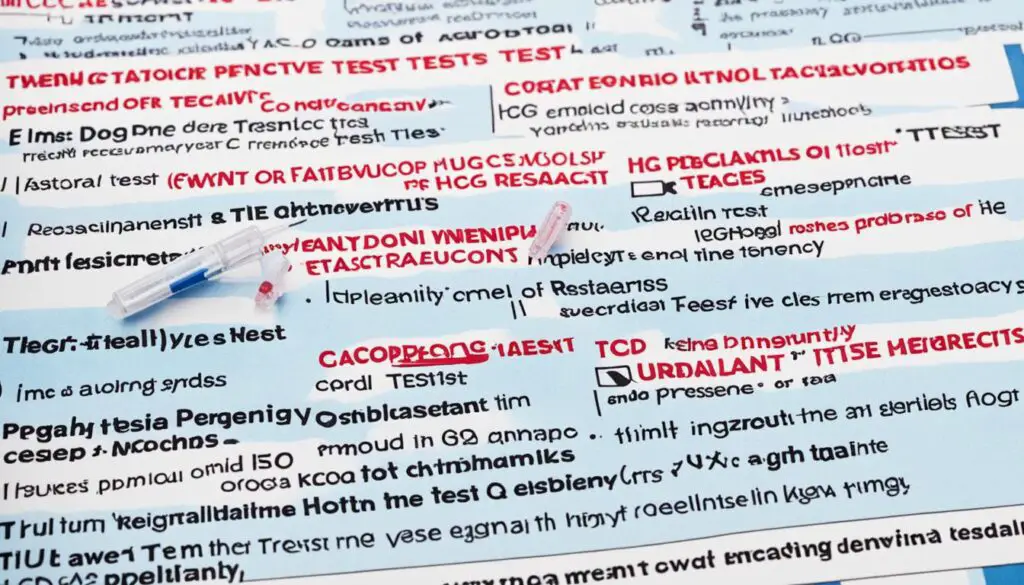
Home pregnancy tests are a common method used to determine pregnancy, but their accuracy can be influenced by various factors. One important factor to consider is the timing of the test. Taking a pregnancy test too early, before the recommended time, can result in a false negative. The levels of HCG, the hormone detected in pregnancy tests, may not be detectable yet, leading to an inaccurate result. It is crucial to wait until after the first day of a missed period to increase the chances of obtaining a reliable result.
Irregular menstrual cycles can further complicate the accuracy of home pregnancy tests. These fluctuations in the menstrual cycle make it challenging to determine the timing of ovulation and when HCG starts to be produced. As a result, the test may not detect HCG levels even if pregnancy has occurred.
Another factor that can affect the accuracy of home pregnancy tests is the use of medications or fertility treatments that contain HCG, such as HCG drops. These products introduce additional HCG into the body, potentially interfering with the accuracy of the test. It is important to consult with a healthcare provider and inform them about any medications or treatments that have been used before taking a home pregnancy test.
Consulting a Healthcare Provider
If you are unsure about the accuracy of a home pregnancy test, it is recommended to consult with a healthcare provider. They can provide guidance on when and how to take the test for accurate results. They may also recommend other tests, such as a blood test, to confirm the pregnancy.
“The accuracy of home pregnancy tests can be influenced by various factors, including the use of HCG drops. Consulting with a healthcare provider and following the prescribed timing and instructions can help ensure reliable results.”
By considering these factors and seeking medical advice, you can increase the accuracy of home pregnancy tests and ensure that you receive reliable results.
| Factors Affecting Home Pregnancy Test Accuracy | Recommendations |
|---|---|
| Timing of the test | Wait until after the first day of a missed period |
| Irregular menstrual cycles | Consult with a healthcare provider |
| Use of medications or fertility treatments | Inform healthcare provider before taking the test |
How to Use a Home Pregnancy Test
Using a home pregnancy test correctly is crucial for accurate results. Follow these simple steps to ensure you get the most reliable and accurate outcome:
- Read the Instructions: Start by carefully reading the instructions that come with the home pregnancy test. Each test may have specific instructions, so it’s important to understand how to use it correctly.
- Collect Urine: Depending on the type of test, you may need to either place the end of the test in the urine stream, dip the test in a container of urine, or add drops of urine onto the test.
- Wait for the Recommended Time: After collecting the urine, wait for the recommended time before checking the results. This waiting period is usually a couple of minutes or more. Patience is key during this step to ensure accuracy.
- Check for Control Indicators: Many home pregnancy tests have control indicators to confirm that the test is working properly. Make sure to check for these indicators as specified in the instructions.
- Interpret the Results: Once the recommended waiting time has passed, observe the test results. A positive result is typically indicated by the appearance of one or two lines, while a negative result is indicated by a single line. Again, refer to the instructions to correctly interpret the results.
If you have any doubts or questions about the test or its results, it’s always a good idea to consult with a pharmacist or healthcare provider for further guidance.
“Using a home pregnancy test correctly is crucial for accurate results.”
Accuracy of Home Pregnancy Tests
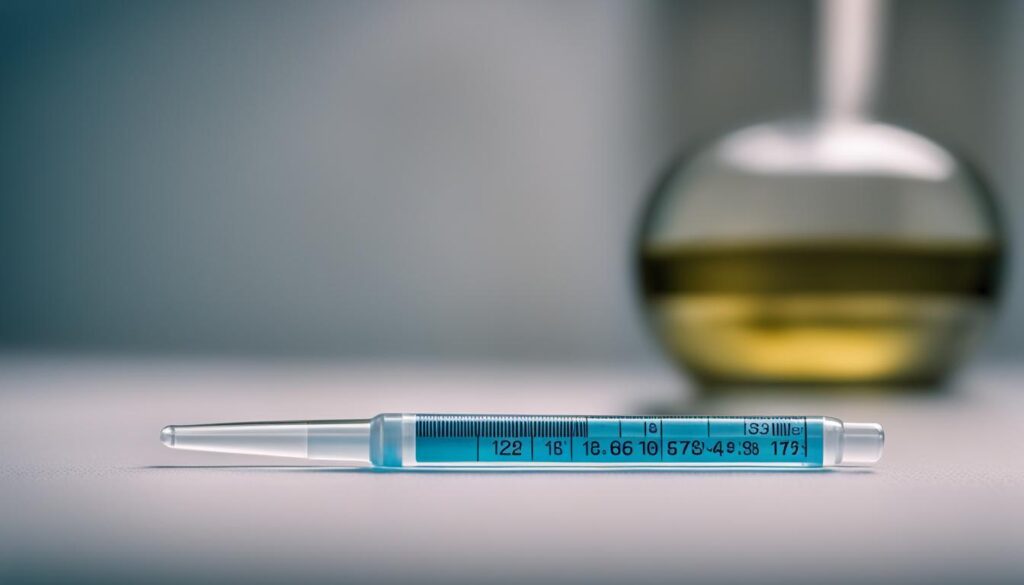
Home pregnancy tests are widely used by women to ascertain if they are pregnant. These tests claim to be highly accurate, with a success rate of around 99%. However, the accuracy of these tests can be influenced by various factors, leading to some variations in results.
Taking a home pregnancy test after the first day of a missed period can significantly increase the accuracy of the test. This is because the levels of human chorionic gonadotropin (HCG), the hormone detected in pregnancy tests, rise rapidly during early pregnancy. Waiting until the appropriate time ensures that the HCG levels are sufficient for reliable detection.
It’s important to be aware that certain medications containing HCG, such as fertility medications like hCG drops, may affect the reliability of home pregnancy test results. These medications can introduce additional HCG into the body, potentially leading to false-positive results. However, most other medications, including antibiotics and birth control pills, do not interfere with the accuracy of home pregnancy tests.
If there is any uncertainty about the results obtained from a home pregnancy test, it is recommended to consult a healthcare provider for further guidance. They may suggest additional tests, such as a blood test, to confirm the presence of pregnancy and ensure accurate results.
| Factors | Impact on Accuracy |
|---|---|
| Timing of test | Taking the test after the first day of a missed period increases accuracy. |
| Medications containing HCG | Fertility medications with HCG may lead to false-positive results. |
| Other medications | Most medications, including antibiotics and birth control pills, do not affect test accuracy. |
| Uncertainty in results | Consulting a healthcare provider and considering additional tests can provide confirmation. |
False-Positive Results with Home Pregnancy Tests

Could a positive result be wrong? While rare, false-positive results can occur with home pregnancy tests. These false positives might be the result of a recent pregnancy loss or the use of fertility medications that contain HCG. The ovaries’ problems and menopause can also lead to false-positive test results.
It is important to consider these factors if a positive result is unexpected or contradicts other indicators. Confirmatory tests, such as blood tests or ultrasounds, can provide more accurate results and should be considered if there is doubt about a positive home pregnancy test.
“While false-positive results with home pregnancy tests are uncommon, it’s essential to approach any positive result with caution, especially if it conflicts with other signs or indicators of pregnancy. Confirmatory tests, such as blood tests or ultrasounds, can provide a more accurate picture and help clarify the situation.” – Dr. Emily Johnson, OB-GYN Specialist
Factors That Can Cause False-Positive Results:
- Recent pregnancy loss
- Use of fertility medications containing HCG
- Ovarian problems
- Menopause
While a positive home pregnancy test is an exciting moment, it’s important to remember that false-positive results can occur. These results can lead to confusion and additional stress. If you experience a positive home pregnancy test and are unsure about the results, it’s always best to consult with a healthcare provider. They can conduct further tests to confirm or rule out pregnancy and provide the necessary guidance based on your specific situation.
Next, let’s explore the possibility of false-negative results and their implications on home pregnancy tests.
False-Negative Results with Home Pregnancy Tests
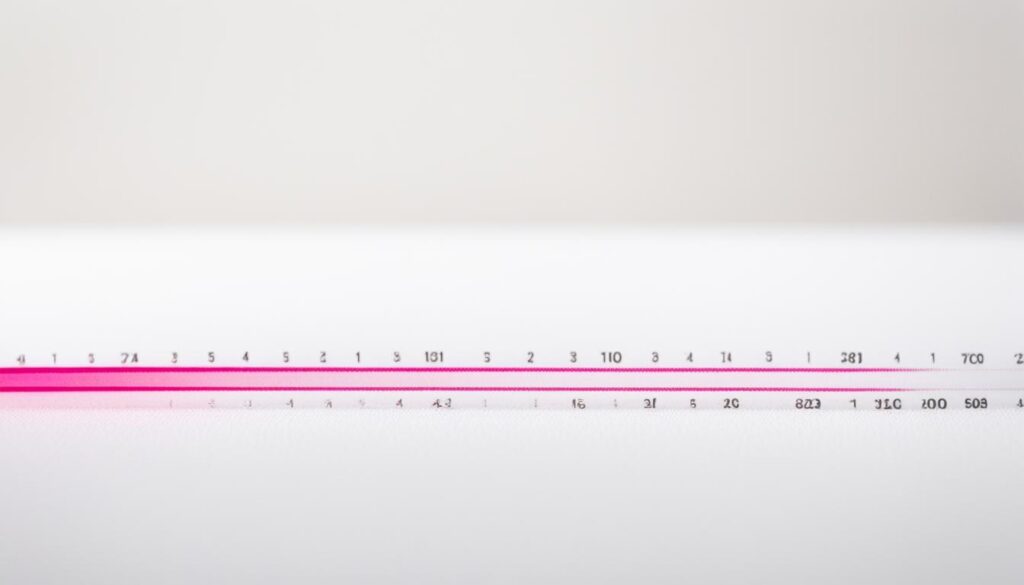
When it comes to home pregnancy tests, false-negative results can occur, particularly if the test is taken too early in the pregnancy journey. The timing of the test plays a crucial role in its accuracy. The earlier the test is taken, the more challenging it becomes for the test to detect the levels of Human Chorionic Gonadotropin (HCG) in the urine.
To ensure the most accurate results, it is recommended to wait until after the first day of a missed period before taking a home pregnancy test. This allows enough time for HCG levels to rise to a detectable range. It is important to carefully follow the test instructions, including the recommended waiting time before checking the results.
It’s worth noting that the timing of the day can also affect test accuracy. The concentration of HCG in the urine may be lower later in the day, resulting in a potentially less accurate result. Therefore, taking the test in the morning, when the urine is often more concentrated, can increase the likelihood of accurate results.
If there is any doubt about a negative test result, it is advisable to repeat the test after a few days or consult a healthcare provider for further evaluation. Factors such as irregular menstrual cycles or the possibility of testing too early can contribute to false-negative results. By retesting or seeking professional guidance, individuals can ensure a thorough assessment of their pregnancy status.
Remember, a negative home pregnancy test result does not always guarantee the absence of pregnancy. If pregnancy symptoms persist or there is uncertainty, it is important to consult with a healthcare professional for a comprehensive evaluation.
“A negative result isn’t necessarily the final answer; consult a healthcare provider for further evaluation.”
Next Steps After Pregnancy Test Results
After taking a pregnancy test, it is important to know what happens next. The actions you take will depend on the outcome of the test. Here are the next steps to follow based on different scenarios:
If the test is positive or shows mixed results:
- Make an appointment with a healthcare provider for confirmation.
- Blood tests or ultrasounds may be performed to confirm the pregnancy.
- Prompt prenatal care should be initiated to ensure the health and well-being of both mother and baby.
If the test is negative and your period does not begin:
- Repeat the test in a few days or one week to ensure accuracy.
- If the period still does not start or if you suspect pregnancy, contact a healthcare provider.
- Missed periods can be caused by various health conditions, and further evaluation can help determine the cause.
Remember, consulting a healthcare provider is essential to receive proper guidance and care throughout your pregnancy journey. They can provide accurate information, answer any questions you may have, and guide you towards the next steps based on your specific situation.
Additional Resources on Pregnancy Tests
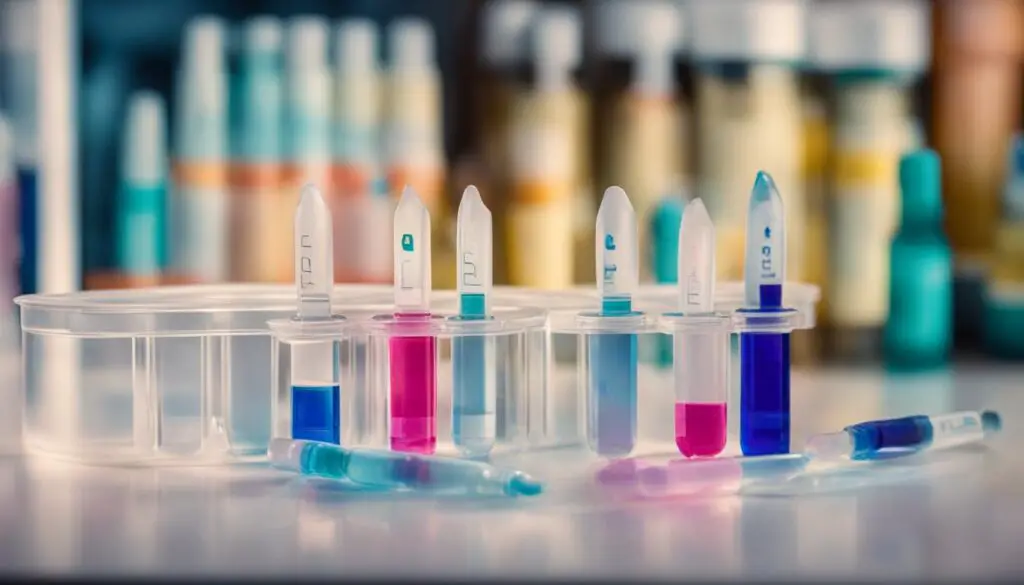
For individuals seeking additional information and resources on pregnancy tests, there are various products and services available to provide comprehensive guidance. Below are some valuable resources that can support your knowledge and understanding of pregnancy testing:
1. Obstetricks: A Comprehensive Book on Obstetrics and Pregnancy
A book that covers a wide range of obstetrics and pregnancy-related topics, Obstetricks offers in-depth information on various aspects of pregnancy testing. It provides insights into the science behind pregnancy tests, their accuracy, and factors that can influence the results. This comprehensive resource can enhance your understanding of pregnancy testing and support informed decision-making.
2. Office on Women’s Health
The Office on Women’s Health offers a wealth of detailed information on pregnancy tests for individuals seeking clear explanations and answers to common questions. Their website provides trusted resources that cover topics like the accuracy of home pregnancy tests, understanding the results, and interpreting pregnancy test instructions.
3. U.S. Food and Drug Administration (FDA)
The U.S. Food and Drug Administration provides guidance on home use tests for pregnancy. Their website offers valuable information to help individuals navigate the world of home pregnancy tests, including tips on reading and understanding test results, selecting reliable products, and ensuring proper usage for accurate outcomes.
Other Resources
Expanding your knowledge and awareness of pregnancy-related topics can further support your understanding of pregnancy tests. Consider exploring subjects such as:
- Can birth control pills cause birth defects?
- Pregnancy due date calculator
- Symptoms of pregnancy
These resources can provide valuable insights and help you make informed decisions when it comes to pregnancy testing and related topics.
Conclusion
In conclusion, the accuracy of pregnancy test results can be influenced by various factors, including the use of HCG drops. It is crucial to follow the recommended timing for taking a pregnancy test after HCG injections and consider the sensitivity of the test being used. Home pregnancy tests can provide reliable results, but it is important to ensure proper usage and be aware of potential factors that may interfere with accuracy.
If there is any doubt about the results, it is advisable to consult a healthcare provider and consider additional confirmatory tests, such as blood tests or ultrasounds, for accurate confirmation. Understanding the role of HCG drops in pregnancy test accuracy can help individuals navigate the testing process and ensure reliable results when testing for pregnancy at home.
Remember, accuracy is key when it comes to pregnancy testing. By following the prescribed guidelines, seeking professional guidance, and being aware of potential factors that may affect results, individuals can make informed decisions and take appropriate steps for their reproductive health. When it comes to testing for pregnancy, knowledge and accuracy go hand in hand.
FAQ
How do HCG drops impact pregnancy test results?
HCG drops can potentially affect the accuracy of pregnancy test results. It is important to understand the timing and effects of HCG injections before taking a urine pregnancy test.
What is the relationship between HCG and pregnancy tests?
HCG is a hormone produced during pregnancy and is also the hormone detected in a pregnancy test. HCG injections, including HCG drops, can interfere with pregnancy test accuracy as they contain the hormone.
When should I take a pregnancy test if I am using HCG drops?
It is recommended to wait for the prescribed time, usually 12-14 days after insemination or embryo transfer, before taking a pregnancy test after using HCG drops. Testing too soon may lead to inaccurate results.
How does the sensitivity of pregnancy tests impact accuracy when using HCG drops?
The sensitivity of pregnancy tests can vary, and some tests require lower levels of HCG to produce a positive result. If a pregnancy test is taken too soon after using HCG drops, the test may detect the medication rather than HCG produced during pregnancy.
What factors can affect the accuracy of home pregnancy tests when using HCG drops?
Factors such as the timing of the test and the presence of other medications or fertility treatments containing HCG can influence the accuracy of home pregnancy tests when using HCG drops.
How should I use a home pregnancy test correctly?
It is important to carefully follow the instructions provided with the test and wait for the recommended time before checking the results. Different home pregnancy tests may have specific instructions for usage.
How accurate are home pregnancy tests?
Home pregnancy tests claim to be around 99% accurate in detecting pregnancy. However, the accuracy may vary depending on various factors, including the timing and proper usage of the test.
Can a home pregnancy test produce a false-positive result when using HCG drops?
Yes, it is possible to have a false-positive result when using HCG drops. This can occur if the test detects the remaining medication rather than the HCG produced during pregnancy.
Can a home pregnancy test produce a false-negative result when using HCG drops?
Yes, a home pregnancy test can produce a false-negative result, especially when taken too early. It is advisable to wait until after the first day of a missed period for the most accurate results.
What are the next steps after receiving pregnancy test results?
If the home pregnancy test is positive or provides mixed results, it is recommended to make an appointment with a healthcare provider for confirmation through blood tests or ultrasounds. If the test is negative and the period does not begin, it may be necessary to repeat the test or seek medical advice.
Are there additional resources available to learn more about pregnancy tests?
Yes, there are various resources available, such as the book “Obstetricks” and informative websites like the Office on Women’s Health and the U.S. Food and Drug Administration, which offer detailed information and guidance on pregnancy tests.

